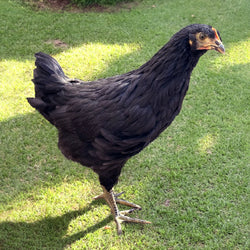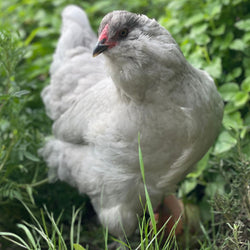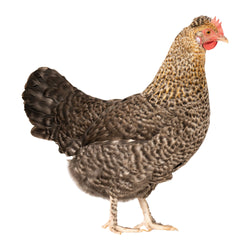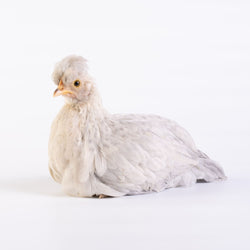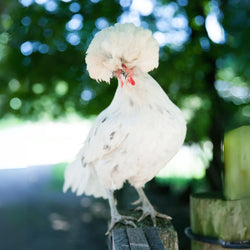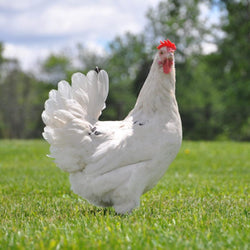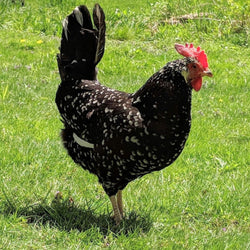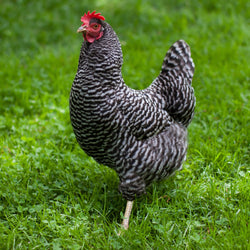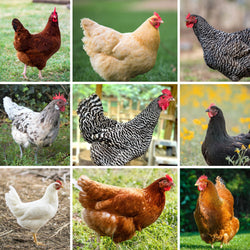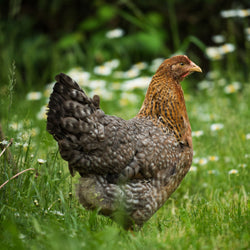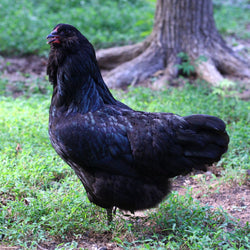page=7/--
Frequently Asked Questions
Here we answer the most commonly-asked questions about ordering, chicken care, and more.
Why do the eggs from one of our hens always smell fishy?
If this is the only symptom you're seeing, she's probably not sick. (If she does show other signs of illness you will want to take her to a licensed avian veterinarian for a firm diagnosis and treatment options.) Interestingly, in some hens that lay brown eggs, eating too much canola or rapeseed meal can cause a fishy smell in the eggs . Not all hens are affected by the process that causes the smell. The smell is caused by the accumulation of trimethylamine (TMA) in the yolk. Most hens metabolize the TMA into another (odorless) compound, but brown egg layers...
Read MoreWhy does my chicken have trouble keeping his balance?
Is your chicken having trouble keeping its balance? A problem like this could be caused by many things. It may end up being nothing of concern...One of our staff had a mixed-breed rooster whose legs were simply quite long--maybe too long for his own good! He went though a period of awkward adolescence in which his legs were growing so fast, he was not terribly graceful. In fact he was outright clumsy, and he often lost his balance when he tried to crow. (Can you imagine how cute that was?) Once he grew into his legs, he no longer lost...
Read MoreIs your breeder stock vaccinated for Marek's Disease?
Yes, we do vaccinate our chicken parent stock. They are vaccinated to prevent several different diseases, including Marek's Disease, Newcastle Disease, Infectious Bronchitis, Infectious Bursal Disease, Fowl Pox, Pigeon Pox, Laryngotracheitis and others.
Read MoreHow do I help a chick that isn't eating or drinking?
Well, first remember that if you hatched these babies at home, chicks don't actually need to eat or drink for the first two or three days... so the fact that your home-hatched chicks aren't eating or drinking immediately isn't always a cause for concern. Strange but true. Hatching is hard work, and with the yolk that they have just absorbed to sustain them, sometimes they just take time to rest and recover. That said, if you've had chicks shipped rather than hatching them at home---or if your home-hatched chicks are a couple days old or seem weak---they will definitely need...
Read MoreAll about Coccidiosis disease
Coccidiosis is very common in chicks, especially ones that may be stressed from shipping or from being introduced to a new location. You can help by keeping your chicks as stress-free as possible, and by keeping their brooder dry. Some people choose to use medicated feed to combat susceptibility to this disease while the chicks develop a resistance, while others use regular feed and have no trouble with cocci. We discuss medicated feed and more, below: Coccidiosis Also called Cocci Prevalence Very common Signs General signs - Loss of appetite, weight loss or stunted growth, ruffled feathers, lethargy, and (for...
Read MoreI plan on vaccinating my chickens. Is there anything else I can do to prevent my flock from getting Marek's disease?
In order to prevent the symptoms of Marek�s disease from affecting your flock, we highly recommend getting your baby chicks vaccinated at hatch. Chicks should be vaccinated as soon as possible after hatching because the vaccine is not effective when given to chicks already exposed to Marek�s disease. In order to increase the effectiveness of the vaccine, keep your chicks indoors and away from all other birds until the chicks are 14 days old, at which point the vaccine will have started to take effect.The symptoms of Marek�s occur more frequently in chickens that are stressed. Some types of stress...
Read MoreMy chicken cannot walk. Does she have Marek's disease?
Lameness is a very common symptom of Mareks� disease, but there are many other conditions that can also cause paralysis or lameness in your chicken. Nutritional Deficiencies, such as rickets, vitamin E deficiency, and vitamin B1 or B2 deficiencies can cause problems that may mimic some of the symptoms of Marek�s disease. Botulism and certain poultry diseases such as Encephalomyelitis, Aspergillosis, or Lymphoid Leukosis can cause paralysis in chickens. If you have a bird showing symptoms of any illness, quarantine her right away, and have an avian vet diagnose her.
Read MoreMy hen was vaccinated for Marek's disease as a chick, but I still lost her to this illness. How could this have happened?
Marek's disease is very common and will eventually end up in most backyard flocks, whether or not the flocks have been vaccinated. It's strange but true! The Marek's vaccination helps prevent some of the most severe symptoms of Marek's disease, but does not prevent the actual transmission of the virus. The vaccine is very effective, but not 100% foolproof, which means a small percentage of vaccinated chickens might still succumb to the symptoms and die. Since the Marek's vaccination prevents tumors in over 90% of vaccinated chickens who are exposed to Marek's, we highly recommend getting your chicks vaccinated at...
Read More







"The Clubhouse" Coop
Easy to assemble and built to last, the Clubhouse Coop is the perfect starter coop for a small flock.
